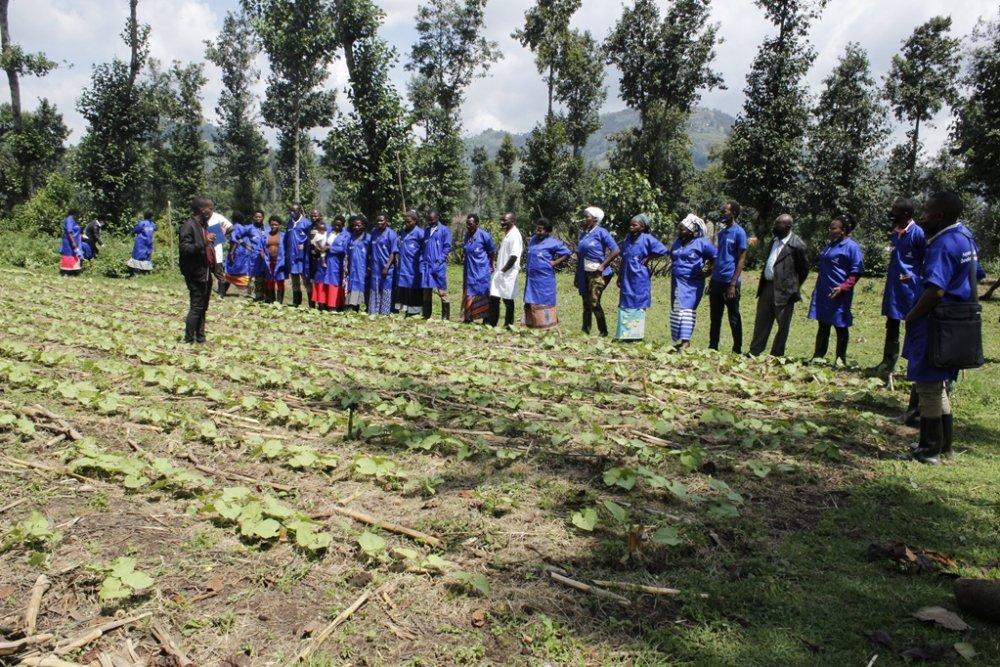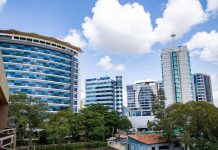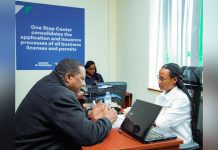Africa-Press – Rwanda. A total of 60 young people from the districts of Musanze and Burera are undertaking a training on best farming techniques in horticulture and fish production with a view to achieve food sufficiency and change beneficiaries’ livelihoods.
The six-month training which kicked off on Friday was organized by Rural Development Initiative (RDI) in partnership with University of Rwanda – College of Agriculture and Veterinary Medicine (UR – CAVM) and Rwanda TVET Board on the funding of SDF.
RDI is a youth led non-governmental organisation (NGO) that focuses on serving individuals and families in the poorest communities. It promotes innovation among youth farmers based in rural Rwanda to boost agriculture production through market oriented farming.
RDI provides trainings with keen interest on value addition, linking farmers to markets, attractive agriculture diversification and providing effective extension services.
Agriculture accounts for 31 percent of Rwanda’s Gross Domestic Product (GDP) and remains the main source of income for majority Rwandans occupying 70% of the labor with the youth constituting 61.7 %.
Figures from the National Institute of Statistics of Rwanda show that Rwanda registers 9.7 million farmers. As enshrined in the Government’s seven years development blueprint, Rwanda plans to leverage technology to transform and modernize the agriculture sector.
It is under this context that the youth from Northern Province has started receiving training on best practices to make agriculture sector more efficient to national development and individual’s economic growth.
Beneficiaries of the training have expressed optimism that the training will be helpful along the journey to transform livelihoods, attain food sufficiency and transition from agrarian to market oriented agriculture.
Godelive Nyiramwiza practicing horticulture has revealed that farmers’ produce would rot in storage facilities because they had lacked relevant skills on post-harvest handling techniques.
“We used to grow fruits and vegetables with inadequate skills to select the best seeds and grow crops appropriately. This would result into low yields and persistent losses due to lack of market information and skills to handle the produce,” she said.
“The training will help us to improve farming techniques, and acquaint us with best ways to preserve the produce. Apart from the fact that we will be linked to buyers, we have optimism for increased yields to achieve food sufficiency and reserve for the market,” added Nyiramwiza.
Jean de Dieu Ntamagezi, a farmer breeding fishes in Lake Burera has also explained that the training will help them to increase fish production and reduce imports.
“We have been faced with different problems including lack of skills, fish seeds and feeds which resulted into low fish production. For instance, we used to receive orders for 15 tons but would only deliver 1 ton. We expect the training to help us increase production to reduce the country’s reliance on imports,” he said.
The Chief executive of RDI, Aimé Kayumba has said that the training is meant to provide skills and technical know-how to young people and women involved in horticulture and fish production.
“The training is meant to build their capacities to make the sector more resilient. Vegetable and fruits produce was poor and wasted in some instances. We will not only enhance their skills to increase quality and quantity, but also we will link them to markets,” he noted.
Kayumba urged trainees to make good use of acquired skills to make agriculture more relevant to national development. Dr. Antoine Karangwa, the Dean of the school of Agriculture and Food Sciences at CAVM has called on farmers to tap into opportunities available in the sector to make it a sustainable source of income and positively impact their respective communities.
Rwanda targets to increase agricultural produce by 10.4% in 2024 from 5.2% of 2017. A total of 60 young people from the districts of Musanze and Burera are undertaking a training on best farming techniques in horticulture and fish production.
Agriculture accounts for 70% of labor force in Rwanda. RDI provides trainings with keen interest on value addition, linking farmers to markets, attractive agriculture diversification and providing effective extension services.
For More News And Analysis About Rwanda Follow Africa-Press






